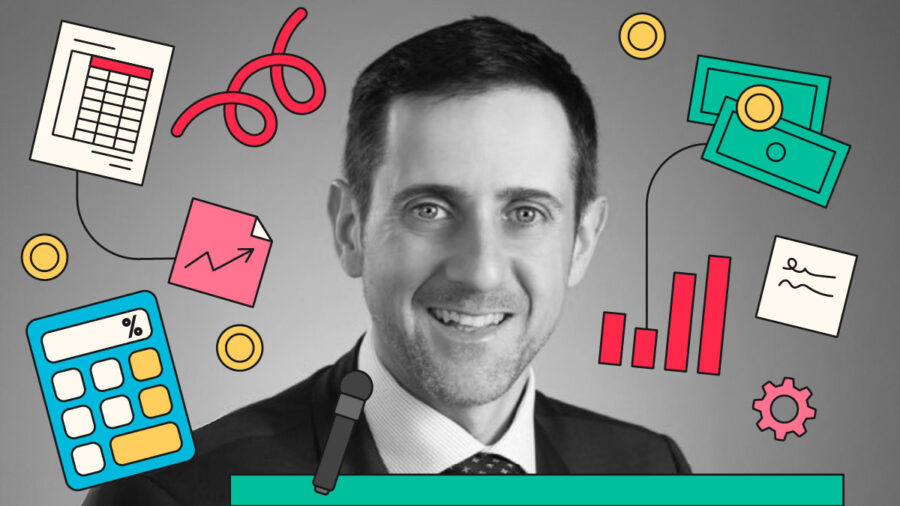
Born and raised in France, Renaud Heyd studied finance in Glasgow before joining SAP, the enormous German software company, in 1998. Over the years, he’s held various senior roles at SAP before stepping into his first CFO position with SAP Belgium & Luxembourg. Here, Heyd reflects on the resilience and energy that shape his approach to leadership and why he avoids emails, television and driving as much as possible.
How did you become a CFO?
I always wanted to be one – that’s why I joined SAP. I started as a financial controller and worked in that role for about 10 years in different countries. At one point, I told my manager I wanted to be a CFO within five years. He gave me a choice: follow a five-year training program or take a CFO role right away and learn on the job. I chose the second option and became CFO of SAP Belgium & Luxembourg, moving to Brussels with my family.
SAP’s culture gave me room to take risks and learn. I made mistakes, but I knew I had permission to grow through them. I also had support from an experienced CFO in the Netherlands who coached me by asking questions instead of giving answers, which taught me to find solutions myself. That’s something I now try to do with the people I lead.
What skills or traits does a good finance leader need?
The first two are resilience and energy. In tough times, people expect us to stay calm and have a plan, even if it’s not perfect. Another is leadership, because finance is about people. We have to explain decisions in a way that makes sense and inspires others. The last one is storytelling. Numbers alone don’t inspire action. We need to tell the story behind them in a language everyone can understand.
What excites you most about your current role?
I’ve been in this role for seven years because I love it. My view is, if you don’t change roles, change the role. I’ve shifted from focusing mainly on financial operations to being more of a business partner and thought leader. I trust my team to run finance, which frees me to spend time with customers, give presentations and share insights from more than 20 years at SAP. It’s rewarding when customers come back and say my input helped them succeed.
What’s the biggest challenge facing your sector at the moment?
AI is on everyone’s mind. People see the potential and the risks, but often don’t know what steps to take. At SAP, we follow the three Rs. AI must be reliable, relevant and responsible. Reliable means based on trustworthy data. Relevant means only used when it’s truly the right tool. Responsible means a person must always make final decisions, especially when it relates to people. AI should only support, not replace, human judgement.
What single thing would make your job easier?
Fewer emails. Email slows down productivity and creativity. I prefer a quick chat on Microsoft Teams, a short meeting or a conversation in the office hallway. Five minutes of talking can solve what would take 20 emails. That’s why I make myself accessible. I’m in the office four days a week, so people can easily reach me in person.
What is the best business advice you’ve ever received?
The year I didn’t get the bonus I expected, my manager told me I hadn’t been vocal enough. I thought sending a report was enough, but I wasn’t speaking up and positioning my ideas. The advice was: earn your seat at the table. Don’t talk just to talk; speak constructively and with confidence.
For me, that sometimes starts with saying, “I don’t understand.” If something doesn’t make sense to me, maybe it doesn’t make sense at all and raising that can help the team improve its strategy.
Which book should every finance leader read at least once?
A Bit of a Stretch: The Diaries of a Prisoner by Chris Atkins. It’s funny but also shocking. It reinforced how important compliance is and that negligence has consequences. It gave me perspective. During the Covid-19 pandemic, I used to joke about feeling like I was in prison on video calls. After reading the book, I stopped saying that.
The book was also a reminder that things can change very quickly. As finance professionals, we carry legal responsibility for our companies and even negligence can have serious consequences. For me, it was a clear lesson that controls and compliance are central to the role of a CFO.
What do you do outside of work to avoid burnout?
It’s more about what I don’t do. I live without a TV and without a car. We do have a family car, but my wife drives it. For the last eight years, I’ve not had my own car. I walk, cycle or take public transport instead of driving. That gives me more exercise and more social interaction. I’m also involved in community work, which lets me give back and also get advice and support from others.
Most of all, I focus on knowing my values, motives and strengths. If you know what makes you proud, what makes you happy and what makes you strong, decisions become much easier.
What’s been your proudest achievement in your current role?
Two stand out. The first is navigating the Covid crisis. We had to balance protecting SAP’s financial stability with supporting our customers and we also had to keep employees safe and productive. I worked long hours, but it made me proud to know we had a positive impact.
The second is hearing our managing director repeat ideas or language I’ve shared. When my story becomes the business’s story, I know I’ve made a difference.
If you weren’t a CFO, what would you like to do?
There are actually two things I would consider. I might be a florist. People buy flowers in the most emotional moments of their lives – when they are in love or in grief – and flowers are a way to show empathy, tenderness and care.
I also trained as a private pilot and that taught me lessons I use in leadership: aviate, navigate, and communicate. Be in control, know where you’re going and communicate clearly. My instructor told me: “It can be messy, but it cannot be dangerous. The difference is one second.” In business, the same is true. If you wait too long to act, it can become dangerous.

Born and raised in France, Renaud Heyd studied finance in Glasgow before joining SAP, the enormous German software company, in 1998. Over the years, he's held various senior roles at SAP before stepping into his first CFO position with SAP Belgium & Luxembourg. Here, Heyd reflects on the resilience and energy that shape his approach to leadership and why he avoids emails, television and driving as much as possible.





